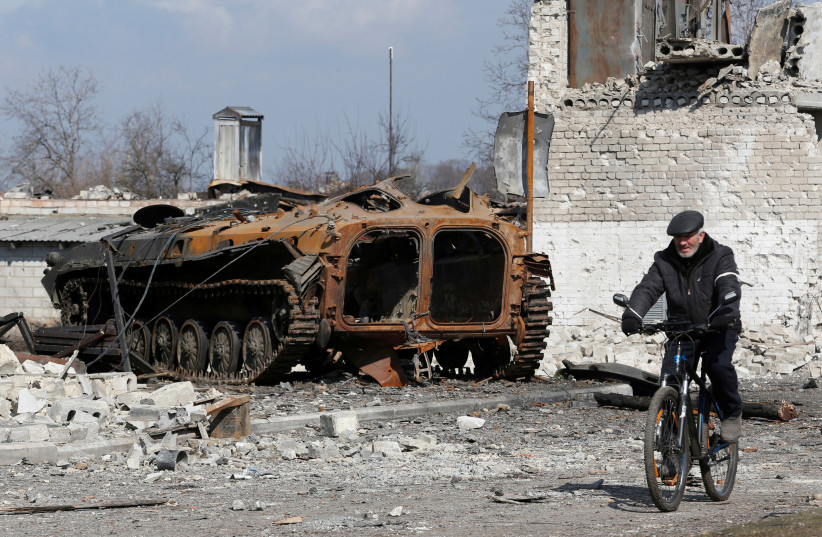During the Ukraine crisis, there have been great demonstrations of support from some religious leaders for the suffering victims. Still, is world religion producing enough? Can’t – shouldn’t – there be a greater basis for support in religion itself?
Prayer, after all, is aspirational. Aside from adherents who unqualifiedly believe that prayer will invariably result in God’s grace, we can only pray (no pun intended) that good or redemption actually come of prayer.
Further, in the view of so many ethically committed people, good deeds such as helping the world’s downtrodden doesn’t really require religion or indeed, belief in God. Good people do good things constantly without actually being acquainted with the recipients of their deeds – and seemingly without the need for a belief in God or any kind of religious observance as a guide or inspiration. The thinking expressed here may indeed seem heretical to many. But still, many atheists exist among the finest people who currently walk the earth or preceded us.
The world now faces one of the greatest man-made calamities of recent times. Religionists worldwide have prayed for the people of Ukraine. Has it helped? Maybe. Perhaps the devastation in Ukraine would be worse without prayer.
And yes, many clergy members have traveled on missions to Ukraine in recent days on behalf of their congregations. They have brought food, medicine, supplies and, perhaps most critically, visible support. All good. Still, recognizing that the view expressed here may appear to diminish the value of religious identification, clerical collars and yarmulkas, and the faiths that inspire them, are hardly a sine qua non to these eleemosynary acts. Again, being good people with sincere humanitarian motive undoubtedly suffices.

Put otherwise, does one need to believe that God took the Hebrews out of the slavery of Egypt or that Jesus died on a cross to expiate mankind’s sinfulness to want to help the victimized people of Ukraine? Or for that matter, anyone else suffering? Indeed, all the nations of Europe and the US, which are secular entities, are opposed to Russian President Vladimir Putin and are helping Ukraine.
Where then, one might ask, does this travel? Does it intend to communicate that religion, even belief in God, is unnecessary – that ethical humanism is sufficient? Skip daily mass? Leave Torah study behind? Pious technicalities and prayer that are basic to some religious observances are essentially beside the point?
Certainly not. It’s something different. Yes, it seems true, a component of virtually every world religion directs, if you will, aid to the helpless or abandoned. Look, though, at the Ten Commandments – rules that (ostensibly) sit at the pinnacle of God-proclaimed essentials of human conduct for the three great monotheistic religions.
Where, in those critical directives, though, do we find a religiously-required need to help the people of Ukraine or to have helped the suffering people of Syria? Indeed, would we have found there a religious obligation to come to the aid of the victims of the Holocaust?
Indeed, the stories in the Hebrew Bible – morality plays, if you will – may be extremely meaningful in helping to formulate human conduct for those who pay attention to them. But those stories in particular, don’t teach us to do what the rabbi-missionaries to the Ukraine have done. That is, to potentially risk personal safety to help those victimized by tyranny in a foreign land. Maybe it’s our Jewish nature that instructs them to do God’s work. Perhaps it’s because Jews suffered so badly in the last century.
Maybe it’s that the rabbis (as have the leaders of the other world religions) somehow have interpolated onto their religious practices – recruited in the brilliant phraseology of Yuval Noah Harari in a somewhat different context – and adopted from contemporary moral thinking the true and sometimes embedded meaning of scriptural requirement.
So, perhaps, they are able to find in the crevasses and interpretations of ancient scripture the moral needs of modernity. If rabbis, priests, ministers and imams can somehow find moral dictates in scripture otherwise unrecognizable there by us the world is a better place.
And maybe, finally, that is precisely the greatly added value of religion in times of world crisis and even in crises of a lesser dimension. Perhaps, we are mired in daily observances and are thus unable to see the forest for the trees. Maybe a thoughtful clergy can successfully reveal for us the forest by teaching us what we really need to learn and hopefully what God really intended. And for certain, we need far more of it.
The writer, a frequent author, practices white collar criminal defense law at Stroock & Stroock & Lavan in New York and is the author of Moses: A Memoir (Paulist Press, 2003).
